David’s in remission after compassionate drug access
At around the age of 61-62, things started changing for David Boyle, which in retrospect marked the onset of amyloidosis.
Over two years, he lost his fitness – David’s measure of wellness.
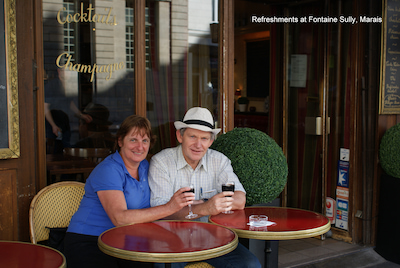
Initial tests revealed nothing and his condition worsened. In turn, his psychological wellbeing was affected. He sensed something was wrong, but nobody could tell him what it was. It was a perplexing and torrid time.
Finally, in mid-2018, a cardiologist identified “the problem” within five minutes, after asking David a series of questions. She told him, “I’m very sure it’s cardiac amyloidosis”. This diagnosis was confirmed and following treatment with a new targeted therapy – daratumumab (Darzalex®), after failing to respond to chemotherapy, David is now in complete remission.
“To me, it’s nothing short of a miracle,” he said.
While having access to daratumumab was fundamental to David’s recovery, he says, “having a diagnosis was even more fundamental”.
“If it wasn’t for that diagnosis, I think we know what the outcome would have been!” said David, 66, who lives in Melbourne and is now retired.
David’s initial symptom – a gradual decline in fitness
David’s journey with this rare form of blood cancer began in 2016. At 61, the land surveyor who had an administration role in the state public service was physically fit, running around 80km a week and consistently covering 10km in about 34 minutes.
Gradually, the length of his runs dropped to six kilometres, then he had to stop for a break halfway through his runs. He thought it was his age and he was getting lazy.
“In hindsight, I think I was starting to feel the effects of amyloidosis,” said David.
“The proteins [light chains] in my bone marrow were being deposited on the walls of my heart, which were gradually getting thicker, so the heart was less flexible, which is why I was not able to perform like I had previously.”
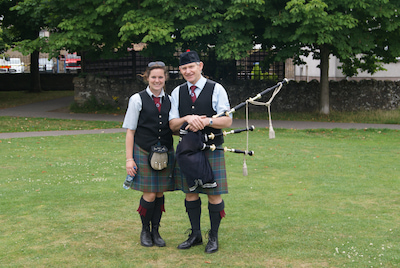
David first felt “there was something wrong” in September 2017, when he and his wife, Kathy, went to visit one of their daughters in the U.S. for six weeks.
“We were in New York with her, and we walked many, many miles every day. By mid-afternoon I felt tired and had chest pain,” explained David.
Because he was due to have a hernia operation in early December, he put the cause of these symptoms down to “the hernias starting to drag me down a bit, so didn’t think much of it”.
After returning to Australia, David went for a run but “after about three kilometres, I got really dizzy and short of breath”.
“It seemed a little odd. I didn’t think I’d lost that much physical condition in the time we were away,” he said.
“I persisted, and each day it was harder and harder to run, and I was running shorter and shorter distances before I had to stop and walk, but I didn’t think a great deal of it.”
When David was admitted to hospital for his hernia operation, the anaesthetist delayed the surgery after David mentioned being short of breath and having heart pain.
“I was asked to do a stress test and I visited a cardiologist but there was nothing noticeable in the scans,” said David, so the hernia operation went ahead and was successful.
“Again, in hindsight, looking at the scans that were done then, some minor thickness of the heart walls was evident, but they weren’t looking for that at the time. We didn’t think much of it.”
Additional symptoms emerged – loss of appetite, weight loss, anxiety
Six weeks later, David was back running and going to the gym.
“I noticed my condition hadn’t improved and I began to lose my appetite and lose weight.”
In March 2018 the Boyles headed off to Queensland for a week-long holiday at Tangalooma island and during their time away David described his behaviour as “unusual”.
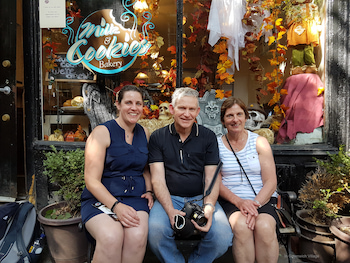
“We’d always done a lot of walking, and I couldn’t walk. I didn’t want to go for meals, I didn’t have an appetite. I was waking up in the middle of the night and couldn’t go back to sleep.”
When they got back to Melbourne, David spoke to his GP who knew his medical history well.
“He felt, even at that time, that my lack of fitness was because I wasn’t working hard enough. So I continued to work hard at regaining my fitness, but it wasn’t working,” said David.
He was also feeling frustrated and annoyed at work, and “wasn’t in a great frame of mind”.
Six weeks later, he went back to his GP when his fitness still hadn’t improved but was getting worse. He saw a neurologist and a respiratory physician and had a range of tests, as well as an endoscopy and colonoscopy, which all revealed nothing.
“I wondered whether there was actually anything wrong with me or whether things at work had got to the stage where I was making this all up,” said David.
“I was not in a good place and I wondered if it was medical or psychological.”
“Towards the end of May 2018, I just broke down. I had something of an anxiety attack [his first ever]. I just didn’t know what the hell was going on.
“I couldn’t work it out, so I went back to my doctor, who in consultation with a colleague, felt it was psychological, so I was admitted to a clinic, for a ‘short-term’ visit.”
When David found out this visit was to be “about three weeks”, he immediately baulked, and after four days he discharged himself with his wife’s blessing but remained on medication for another six weeks.
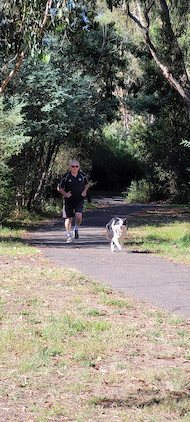
“That was one of the worst periods of my life,” he said. “I was totally unaware of what was going on, and the drugs didn’t seem to be changing my mental state.
“It was fairly horrific for my wife and our other daughter, Fiona, who lives here.”
At a follow-up appointment, the psychiatrist told David, “this is not a psychological issue, it’s medical. You need to look elsewhere for further medical evidence” and he was referred back to his GP.
David’s wife insisted “there’s something wrong with David”
Then, late one Friday evening at the end of June, David’s wife, “in frustration”, took him to a Melbourne hospital, and said to the admitting doctor, “look, there is something wrong with David, but we don’t know what it is”.
“I spent some time with him trying to discuss what had happened and where I was at and I remember his comment. He said, ‘I don’t know why I’m admitting you, but I’m going to because you are a puzzle, and we have a specialist physician here who is very good at solving puzzles.”
David spent 10 days in hospital under the care of a specialist physician; a kidney specialist who initially referred him to a neurologist for additional tests. Then David was visited by a cardiologist, Monique, whose husband also was a cardiologist, and she immediately suspected cardiac amyloidosis. This was confirmed with a bone marrow biopsy and cardiac MRI.
“It gave us somewhere to start, and provided enormous relief, particularly to my wife,” said David about getting a definitive diagnosis.
“Monique said, ‘we cannot cure this disease, but we can treat it. Five years ago there had been no treatment for this’. She said, ‘you are very fortunate it’s cardiac amyloidosis, and not amyloidosis of another organ, because your heart will recover’.
“Knowing what I had and that there was a very good chance I’d recover for whatever period – one, two, five or 10 years – was fundamental,” said David.
“I was told about the risks and the things I needed to do, and fortunately my wife was there and could take this on board because to be frank, I couldn’t focus on anything.”
In a side story, while the cardiologist had introduced herself as Monique Watts, her surname hadn’t registered with David during his initial consultation. When David explained that his lung capacity “was really good, I play the bagpipes”, Monique said, “that’s interesting, I play the bagpipes as well”.
It turned out that her brother, Jared Watts, was a very good friend of David’s and his band’s drum tutor!
“It’s just such a small world, and Monique has been just so very good to Kathy and me,” said David.
“I’m so lucky, so much of my story is about being in the right place, at the right time.”
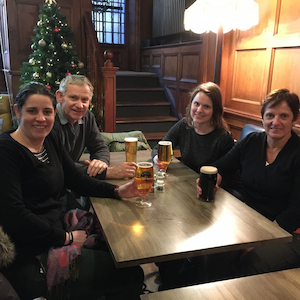
The option of a clinical trial
Monique told David about a clinical trial she’d like him to consider. It was being run at a different hospital by Dr Simon Gibbs. The randomised phase III ANDROMEDA trial which was evaluating daratumumab and CyBorD* compared to CyBorD, the standard of care protocol, in newly diagnosed AL amyloidosis.
“Simon came to see me. He was very upbeat and encouraged me to do the trial,” explained David.
“Obviously, a trial was going to benefit me, but I also thought it might help someone else, so I really wanted to go down that path.
“Our other daughter Samantha, who lives in Cambridge in the UK has a PhD in medical research, albeit her research was in skin cancer, and I knew how important it was to Sam – both in getting her qualification and being able to help people – for people to participate in things like this.”
“Her PhD took five years and in that time she only had 89 melanoma samples to work with because people were reluctant to participate.”
David agreed to the trial but it took a month to be accepted on to the trial, due to concerns about his blood pressure. During this time David wasn’t on any treatment and his condition “deteriorated significantly”.
He’d lost all the feeling in his hands and feet during the 10 days he was in hospital having tests and being diagnosed. When he got home, he struggled to walk and struggled to eat and continued to lose weight.
“In the end I was virtually just taking protein shakes,” said David, and his weight had dropped by 26 kilos.
“I couldn’t do anything at home. I couldn’t make the bed, close a snap-lock bag or put a peg on the clothesline because I didn’t have the strength in my arms and legs or in my thumbs and fingers, and I was dizzy.
“Tilley, our border collie, would come and lie by the bed all day. She never moved,” said David, who used to walk Tilley every morning and every night after dinner.
“My wife was very concerned because my condition deteriorated rapidly. She kept questioning me about waiting to go on this trial…. ‘why not just go straight on the standard treatment?’.
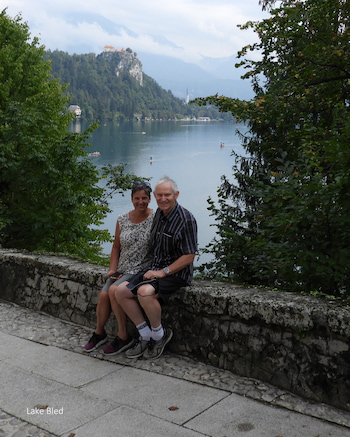
“Fortunately, I persisted but this was a real challenge.
“On the 26th of July confirmation came through from Holland that I could be accepted on the trial and it was just an enormous relief to Kathy and me.
“Disappointingly, I was told I’d be on the control side of the trial, but happily still receiving the standard treatment.”
At that stage tests showed David’s protein count was about 1000mg per litre, which he said was “about 50 times normal, and my heart walls were about 2.5 times normal thickness”. As a fit adult, his resting heart rate had been around 40 beats per minute but prior to going on the trial it was 95 beats per minutes.
“I started my first treatment on the 30th of July and I started to feel better,” said David.
At the end of his second cycle of treatment, his protein count was down to 600.
“This was a significant improvement. I was feeling better and could walk with a walking frame,” he said.
David was refractory to the trial’s control arm – standard treatment
“Simon was encouraged but not overly excited. He had expected the response to be much better,” explained David.
“Then at the end of the sixth cycle, my light chains had returned to 1000.
“Simon said to me, ‘I feel we’re going to have to take you off the trial because you no longer meet the conditions of staying on the trial’.
“So we knew at that stage that the prognosis wasn’t so good.
“Around the end of November, Simon said, ‘I have to take you off the trial’ and that was totally shattering. We felt totally alone.
“Simon and his nurses, who were fantastic, had become like family to us. One of the significant parts of being on the trial was having the same people looking after you. You felt totally cocooned and comfortable.
“Then, here we were. We didn’t have these people anymore. We felt alone. We felt there was no way forward.”
David and Kathy were about to go to Hamilton Island, where they had holidayed for the last five years.
“Simon said, ‘take your holiday. There are four different courses we could take. One of them is to ask the company (Janssen) that manufactures daratumumab to give you this treatment on compassionate grounds, but I don’t like our chances’.
“We didn’t know it at the time, but people who were getting daratumumab on the trial were responding very well.”
“Simon said, ‘go to Hamilton Island, try not to think about this and we’ll have a solution for you when you come back’.
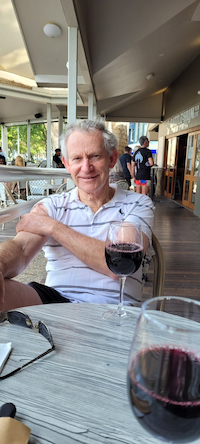
“We went and I was able to sail catamarans and go walking and eat. I was still improving despite being off treatment.”
When David turned on his phone after their return flight to Melbourne, there were several messages from Simon. He wanted David to start treatment on lenalidomide that coming week and when David replied, he got a call from Simon.
“He was incredibly excited. Janssen had given him the authority to give me daratumumab for two years.
“Kathy and I couldn’t believe it. As you can imagine, we were excited and relieved. Our daughter Fiona immediately burst in to tears when we told her the news. We had no idea whether this treatment was going to work but I’d been given this amazing opportunity.”
David started daratumumab a week before Christmas 2018. During his first dose, which was infused over 14 hours in hospital, he had an anaphylactic reaction to the drug and so his second dose was also administered in hospital. After that he was given daratumumab weekly, then fortnightly, then monthly over the two years, and he had “no noticeable side effects” from the treatment.
Tilley knew David was on the mend
In January 2018, when David was waiting for his blood results, he said to Kathy, “I wonder what my blood results are like” and her response was, “there’s nothing wrong with your blood results”. When David asked what she meant, she said, “have a look at Tilley”.
“When I was sick and couldn’t walk Tilley, Kathy would take her on her morning and night-time walks.
“This Thursday evening, on putting down my knife and fork after dinner, for the first time, Tilley come over and sat beside me.
“Kathy said, ‘there’s nothing wrong with your blood. Tilley has come to tell you to take her for a walk’.
“The next day my protein count was 62. It had stablised from 1000 to 62.”
David’s extraordinary response to daratumumab
After only six weeks on daratumumab, David’s protein count returned to within the normal range, at 25mg per litre. That was in February 2019. Then, after the next treatment, it dropped to 5mg.
At the end of March, David had an appointment with his cardiologist, Monique, and an MRI scan of his heart showed the thickness of his heart walls had reduced from 18mm, when he had first been tested, to 13mm. Then in November 2019, when David had another scan, the technician was concerned and said to Monique, “this is not the same heart that I looked at in March”.
Monique’s reply was, “You’re absolutely right. It’s the same person and it is the same heart, but it’s not the same heart”.
“The thickness of my heart had returned to seven millimetres and there was absolutely no sign of amyloidosis,” said David.
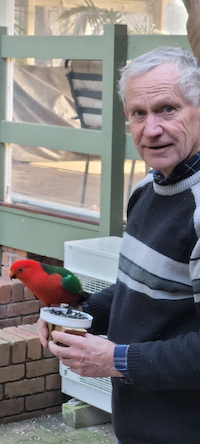
His two years on daratumumab finished in November 2020 and since then he has not been on any medication for amyloidosis and his protein count remains in the ‘normal’ range.
“I’m in complete remission,” said David.
“Simon hopes I’ll remain in remission and won’t need any further treatment.”
In case David does ever need a stem cell transplant, his stem cells were harvested and stored six months into treatment, when his light chains were normal, and he has enough stem cells for two transplants.
David returned to full-time work in February 2019 and worked for 18 months before taking long service leave, then retiring.
He continues to be monitored with blood tests every two months and has noticed a marked improvement in his memory which means he can play his bagpipes without looking at a score sheet. He’s back running 30-50km a week and hopes to run a marathon one day, something he hasn’t done since he was 16.
David says, by way of advice to others, “I encourage anybody to go on a trial if they get the opportunity”.
“It provided me with expert dedicated medical attention from a team of people with great compassion, commitment, experience with amyloidosis, and access to a broad range of people who might be able to contribute. This was particularly helpful and comforting when I was not responding on the trial.”
* a combination of bortezomib (Velcade®) plus cyclophosphamide and dexamethasone